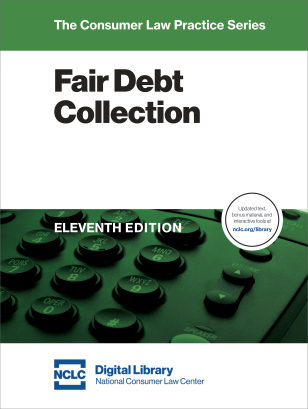A new Consumer Financial Protection (CFPB) Interim Final Rule increases information for tenants about COVID-related protection from eviction, and clarifies that consumers have federal remedies against debt collectors involved in the eviction that fail to provide or misrepresent that information. See 86 Fed. Reg. 21,163 (April 22, 2021) (effective May 3, 2021).
The interim final rule prohibits debt collectors from filing an eviction for non-payment of rent without providing information about the eviction moratorium issued by the Centers for Disease Control and Prevention (CDC) in response to the global COVID-19 pandemic, and that is in effect at least through July 31, 2021. See Centers for Disease Control and Prevention, Dep't of Health & Human Services, Temporary Halt in Residential Evictions to Prevent the Further Spread of COVID-19 (June 24, 2021). The rule also prohibits misrepresentations about consumers’ eligibility for protection under such moratorium.
The Interim Final Rule at 86 Fed. Reg. 21,180, amends CFPB Regulation F, 12 C.F.R. pt. 1006, adding a new § 1006.9. The Federal Register notice also includes staff interpretations of § 1006.9. Regulation F interprets the federal Fair Debt Collection Practices Act (FDCPA). As a result, the new Interim Final Rule applies only to entities subject to the FDCPA and violations of the rule lead to FDCPA actual and statutory damages and attorney fees.
The Specific Rule Requirements
The rule requirements apply to “debt collectors” which is a term defined in the FDCPA. Who is a debt collector for purposes of landlord-tenant issues is examined in the next section, “Who Is a Debt Collector, Covered by the New Rule,” infra.
While the CDC eviction order is in effect, a debt collector must not file an eviction action for non-payment of rent where the CDC order might reasonably apply without a “clear and conspicuous” written disclosure. The disclosure must be provided on the same day as an eviction notice, or on the day of the filing of the eviction action if no applicable law requires an eviction notice.
The disclosure must specify that the consumer might be protected from eviction by the CDC order. See 12 C.F.R. § 1006.9(c)(1). The CFPB provides two versions of sample language that the debt collector can use, but is not required to use, the only difference being the stated basis of the applicable law providing the protection:
Because of the global COVID-19 pandemic, you may be eligible for temporary protection from eviction under Federal law. Learn the steps you should take now: visit www.cfpb.gov/eviction or call a housing counselor at 800-569-4287.
or:
Because of the global COVID-19 pandemic, you may be eligible for temporary protection from eviction under the laws of your State, territory, locality, or tribal area, or under Federal law. Learn the steps you should take now: visit www.cfpb.gov/eviction or call a housing counselor at 800-569-4287.
See Regulation F, Official Interpretations § 1006.9(c)(1)-5.
The CFPB has also published Spanish translations of the sample disclosure language. The rules do not require debt collectors to provide the Spanish translation.
The disclosure can be delivered to the address subject to the eviction proceedings, and the CFPB states that the collector is not required to ensure the consumer actually receives the disclosure. Regulation F, Official Interpretations § 1006.9(c)(1)-3. The disclosure can be, but need not be delivered with the notice, as long as the disclosure is delivered to the address on the same day as the notice. Id.
The disclosure must be “conspicuous,” however, so it should be delivered in a way that the consumer is aware of its delivery. The CFPB provides that “clear and conspicuous” means “readily understandable.” Both the “location” of the disclosure and the type size must be “readily noticeable and legible,” although a type size is not specified. Regulation F, Official Interpretations § 1006.9(c)(1)-6.
A key term is the “eviction notice” triggering the disclosure violation. This is defined as the earliest that a written notice is required by any law to be provided the consumer prior to the filing of an eviction action. See 12 C.F.R. § 1006.9(b)(3). This includes but is not limited to notices to quit, notices to pay rent or quit, and notices to terminate tenancy. Official Interpretations § 1006.9(b)(3)-1.
The disclosure requirement only applies for eviction based on non-payment of rent. The requirement does not apply to eviction based solely on criminal activity while on the premises, threats to health or safety of other residents, threats or actual damage to property, health and safety violations, or violation of other contractual obligations. But if the eviction is based on one of these factors and also on non-payment of rent or late payment of fees, penalties, or interest, then the disclosure requirement applies. Official Interpretations § 1006.9(c)(1)-1.
The disclosure requirement applies where the CDC order reasonably might apply. The debt collector need not comply if it has knowledge that a consumer is not eligible for the CDC protections. The collector though can comply with the disclosure even if the consumer is not covered by the CDC order. Official Interpretations § 1006.9(c)(1)-2, -5. The debt collector need provide the disclosure only once, but it is not a rule violation to provide the disclosure more than once. Official Interpretations § 1006.9(c)(1)-4. A debt collector cannot falsely represent or imply to the consumer that the consumer is ineligible for relief under the CDC order. See 12 C.F.R. § 1006.9(c)(2). This applies to oral or other misrepresentations even if the debt collector provides a proper written disclosure. The FDCPA standard for what is deceptive is whether the least sophisticated consumer would be deceived. See NCLC’s Fair Debt Collection § 3.2.1.
Who Is a Debt Collector Covered by the New Rule
The FDCPA applies to debt collectors, which includes those who regularly collect debts owed to another. This includes attorneys who regularly collect debts or regularly are involved in tenants’ evictions. The Act does not apply to the landlord itself, unless the landlord is collecting in a name that is not its own. Nor does it apply to the landlord’s employees when collecting in the landlord’s name. See NCLC’s Fair Debt Collection §§ 4.2, 4.2.8, 4.3.2.
Enforcing the Interim Rules
Consumers have a private right of action under the FDCPA, which means that tenants and their attorneys can bring FDCPA lawsuits for violations of these rules, either individually or as a class. See the discussion of available remedies below. State and federal courts have concurrent jurisdiction, but the debt collector may seek removal of a state court action to federal court. See NCLC’s Fair Debt Collection § 11.2.1. The statute of limitations on the FDCPA claim is one year from when the violation occurs. See NCLC’s Fair Debt Collection § 12.3.1.
The FDCPA is a strict liability statute. Any violation of the Interim Rule is actionable, even if unintentional. There is a bona fide error defense, but that defense only applies if “the debt collector shows by a preponderance of evidence that the violation was not intentional and resulted from a bona fide error notwithstanding the maintenance of procedures reasonably adapted to avoid any such error.” 15 U.S.C. § 1692k(c). This requires not only that there be a preponderance of evidence that the error is unintentional, but a preponderance of evidence that the debt collector maintains procedures to avoid such an error. Errors as to the law should not be the basis of the bona fide error defense. See NCLC’s Fair Debt Collection § 12.2.
If tenant attorneys observe rule violations affecting their clients, but lack the time or expertise to file an FDCPA action, particularly an FDCPA class action, an alternative is to refer the matter to or co-counsel with an attorney specializing in FDCPA actions. The National Association of Consumer Advocates maintains a directory of legal services and private consumer attorneys by location and practice area (including “debt collection” as a practice area) at: https://www.consumeradvocates.org/find-an-attorney.
Violations of the rules can always be reported directly to the CFPB at: https://www.consumerfinance.gov/complaint/ and the state attorney general’s office may also have separate forms for consumer complaints.
Remedies for Rule Violations
As a final interim rule interpreting the FDCPA, a violation of the Regulation F provisions on disclosures and misrepresentation to tenants leads to FDCPA remedies. These remedies include actual damages and statutory damages of up to $1,000 for individual cases or up to the lesser of $500,000 or 1% of the net worth of the debt collector for a class action. Plaintiffs are also entitled to attorney fees and costs in a successful action. See NCLC’s Fair Debt Collection Chapter 11.
Other Regulation F News
Within the last six months, the CFPB finalized two rules adding extensive provisions to Regulation F interpreting the FDCPA. See 86 Fed Reg. 5766 (January 19, 2021) and 85 Fed. Reg 76,734 (November 30, 2020). Both final rules have an effective date of November 30, 2021. The Bureau is proposing to extend that effective date by 60 days, until January 29, 2022. See 86 Fed. Reg. 20,334 (April 19, 2021). Comments on the proposed extension are due by May 19, 2021.


